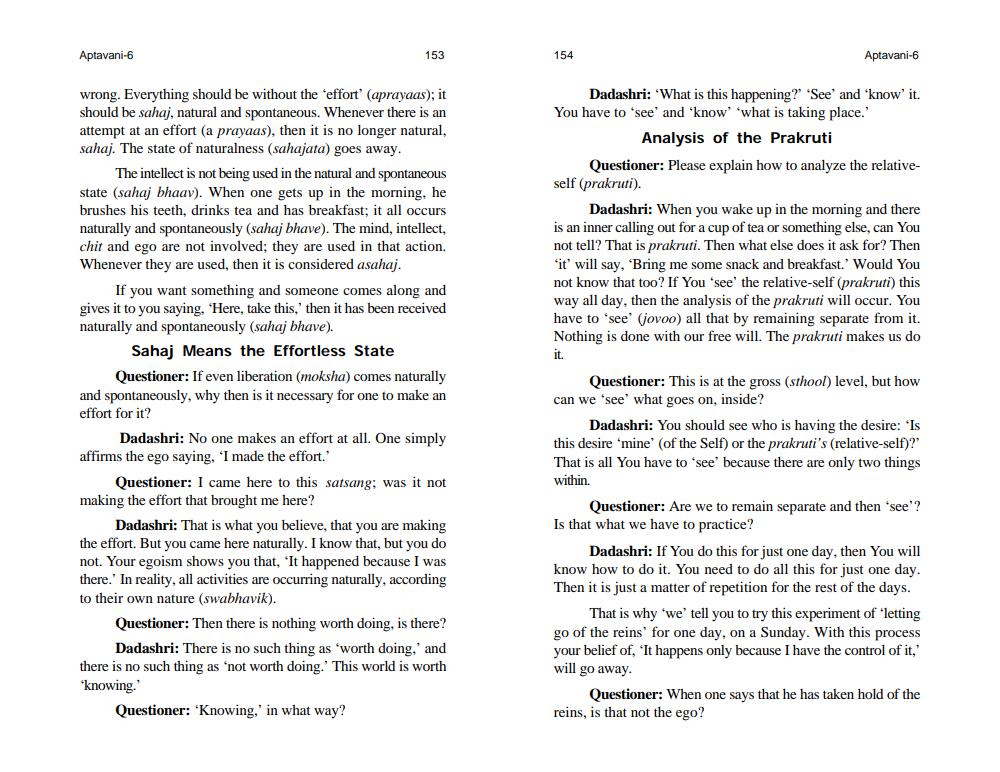________________
Aptavani-6
153
wrong. Everything should be without the 'effort' (aprayaas); it should be sahaj, natural and spontaneous. Whenever there is an attempt at an effort (a prayaas), then it is no longer natural, sahaj. The state of naturalness (sahajata) goes away.
The intellect is not being used in the natural and spontaneous state (sahaj bhaav). When one gets up in the morning, he brushes his teeth, drinks tea and has breakfast; it all occurs naturally and spontaneously (sahaj bhave). The mind, intellect, chit and ego are not involved; they are used in that action. Whenever they are used, then it is considered asahaj.
If you want something and someone comes along and gives it to you saying, 'Here, take this,' then it has been received naturally and spontaneously (sahaj bhave).
Sahaj Means the Effortless State
Questioner: If even liberation (moksha) comes naturally and spontaneously, why then is it necessary for one to make an effort for it?
Dadashri: No one makes an effort at all. One simply affirms the ego saying, 'I made the effort.'
Questioner: I came here to this satsang; was it not making the effort that brought me here?
Dadashri: That is what you believe, that you are making the effort. But you came here naturally. I know that, but you do not. Your egoism shows you that, 'It happened because I was there.' In reality, all activities are occurring naturally, according to their own nature (swabhavik).
Questioner: Then there is nothing worth doing, is there?
Dadashri: There is no such thing as 'worth doing,' and there is no such thing as 'not worth doing.' This world is worth 'knowing.'
Questioner: 'Knowing,' in what way?
154
Aptavani-6
Dadashri: 'What is this happening?" "See' and 'know' it. You have to 'see' and 'know' 'what is taking place.' Analysis of the Prakruti
Questioner: Please explain how to analyze the relativeself (prakruti).
Dadashri: When you wake up in the morning and there is an inner calling out for a cup of tea or something else, can You not tell? That is prakruti. Then what else does it ask for? Then 'it' will say, 'Bring me some snack and breakfast.' Would You not know that too? If You 'see' the relative-self (prakruti) this way all day, then the analysis of the prakruti will occur. You have to 'see' (jovoo) all that by remaining separate from it. Nothing is done with our free will. The prakruti makes us do it.
Questioner: This is at the gross (sthool) level, but how can we 'see' what goes on, inside?
Dadashri: You should see who is having the desire: 'Is this desire 'mine' (of the Self) or the prakruti's (relative-self)?' That is all you have to 'see' because there are only two things within.
Questioner: Are we to remain separate and then 'see'? Is that what we have to practice?
Dadashri: If you do this for just one day, then You will know how to do it. You need to do all this for just one day. Then it is just a matter of repetition for the rest of the days.
That is why 'we' tell you to try this experiment of 'letting go of the reins' for one day, on a Sunday. With this process your belief of, 'It happens only because I have the control of it,' will go away.
Questioner: When one says that he has taken hold of the reins, is that not the ego?




